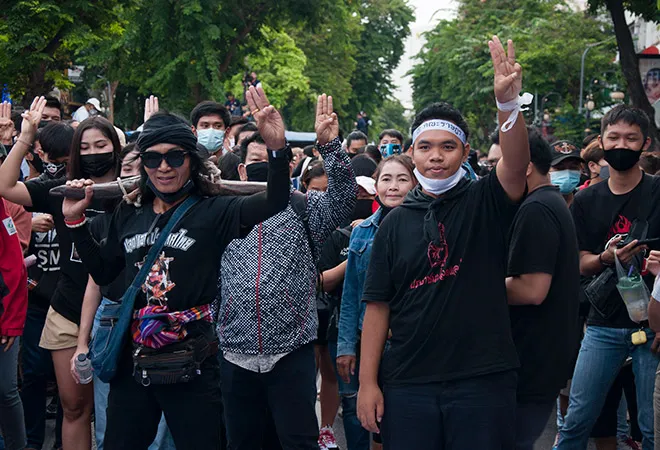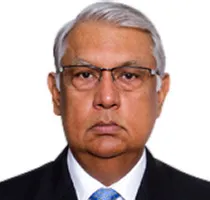For decades since 1932, after the Chakri dynasty gave up absolute power, Thailand has lived under the shadow of military coups. The most recent one was in 2014, when the current PM Prayut Chan-ocha was the army chief. The protesting students are demanding his resignation, fresh elections, a new constitution curbing the king’s powers under a true constitutional monarchy, a proper democratic system and an end to state harassment of protestors. Neither the royal family nor the government have reacted to the demands.
The demonstrations by students have continued for over a month, creating an unprecedented situation. While protests are not new to Thailand, this time there is an anti-monarchy dimension hitherto not seen. King Maha Vajiralongkorn, who succeeded his father Bhumibol Adulyadej after the latter’s demise in 2016, does not enjoy the adulation, respect and moral authority that his dad did among the people. He is almost an absentee king, returning to Thailand from his preferred abode in Germany for short periods to take part in royal ceremonies and state functions.
Upon his return from abroad recently, demonstrators greeted the king’s convoy with protests and slogans while it was driving past the Democracy Monument, a famous landmark in Bangkok. Thailand’s stringent lese majeste laws can put anti-monarchy protestors behind bars for 15 years if convicted. Any criticism of the monarchy and royal family members is not permissible. This long-held custom has been broken this time. To be fair, King Vajiralongkorn had earlier directed that lese majeste should be used cautiously.
Thailand’s political tradition of military coups overthrowing democratically elected governments, on some pretext or the other, always receives the support of the monarchy. There is an “I scratch your back and you scratch mine” relationship between the monarchy and army. Thailand’s monarchy is immensely wealthy, controlling assets reportedly estimated to be above $30 billion. It is reputed to be the richest monarchy in the world. King Vajiralongkorn has gathered all control over the royal assets and also taken charge of appointments over the King’s Guard, a military unit that functions as a praetorian guard. Thailand’s indubitable success in controlling the viral pandemic is noteworthy.
But its tourism-dependent economy has been hit hard by the Chinese-origin Covid pandemic, leading to massive unemployment. Disgruntlement with the royal family’s wealth is one of several manifestations of these demonstrations. The protests in Thailand are not only about democratic reforms but also about overhauling the education sector, economy and arbitrary arrests of activists under draconian emergency laws. This time, high-school students have also joined the protests.
PM Prayut Chan-ocha is a prime target. After his military coup in 2014, he ruled as a dictator and then introduced a new constitution that was passed by the Senate, which was packed with cronies of the military. He then became a civilian PM by political manoeuvring of the election under the new constitution. The popular pro-democracy Future Forward Party, which did well in the election, was disbanded by a government diktat after being accused of electoral fraud.
This triggered protests earlier. Street protests are not rare in Thailand. During governments led by former PMs Thaksin Shinawatra and his sister Yingluck Shinawatra, their supporters, popularly called the “Red Shirts”, frequently clashed with pro-royalist supporters called the “Yellow Shirts”. Thaksin’s Pheua Thai Party had its two earlier incarnations dissolved by the Constitutional court. Political parties in Thailand have had to navigate the entrenched so-called “deep state”, which observers believe consists of the Privy Council that acts on behalf of the monarchy, army and a wealthy coterie of owners of leading business houses.
Political leaders who do not conform to the norms of the so-called “deep state” and seek to challenge the power structure are ousted by decisions taken by a judiciary—its members are handpicked by the deep state and viewed widely as partisan. Both former PMs, Thaksin and Yingluck, are in exile and cannot return to Thailand for fear of being imprisoned in cases where the government has secured convictions through a pliable judiciary. Both former PMs were ousted in military coups. Thailand’s media has allowed a wider debate to surface on the issue of the monarchy and its compatibility with democracy. In a move to deter the demonstrators, the government has initiated action to censor media coverage, raided a publishing house and banned messaging apps.
The Yellow Shirts have been organised to confront student demonstrators. Thailand’s government is clearly on the horns of a dilemma. Initially, it had dealt with the student protestors somewhat softly, hoping the demonstrations would fade away. PM Prayut’s government could lose the support of its coalition partners, the Democrat and Bhumjaithai parties, if the confrontation gets out of hand. China has seen a window of opportunity in the current political and economic crisis in Thailand. Its foreign minister Wang Yi made a visit to Bangkok in a show of support for the government, spiced up by promises of investments to shore up the flailing economy.
Chinese President Xi Jinping has sent a message of support for the king. Beijing has been wooing Southeast Asian countries. It has proposed to set up the Eastern Economic Corridor infrastructure in Thailand as a focal point of the BRI, with a high-speed rail link between the two countries via Laos. In both Cambodia and Laos, Chinese investments and financial largesse have propped up authoritarian governments.
After the Tokyo Quad meeting of foreign ministers, the growing acceptability of a free and transparent Indo-Pacific, and Australia joining the Malabar Exercises, China wants to ring-fence the ASEAN countries and prevent their moving closer to the Quad as this will create hurdles for Beijing’s ambition to be the only hegemon in Asia. China is very keen to get Thailand to agree to build the Kra canal that will permit maritime traffic from the Gulf of Thailand into the Andaman Sea in the Bay of Bengal.
This alternate maritime route will enable China to overcome the “Malacca Dilemma”. Thailand, after deliberating for some time, has shelved the idea of the Kra canal for now, for environmental reasons.
Nevertheless, China’s trade with Thailand is worth around $80 billion and the latter is an integral part of the global value chain for manufacturing. Beijing has overtaken Tokyo as the largest foreign investor. China has now promised more to help Thailand’s digital economy with Huawei’s 5G network.
Thailand has leveraged China’s keenness to build the high-speed rail link, to also build a similar link to Singapore and push down costs quoted by Chinese companies. Beijing’s embrace of Bangkok has the obvious strategic dimension for a China-led Asian order, which can be challenged by the Quad and its expansion in the future.
This commentary originally appeared in The New Indian Express
The views expressed above belong to the author(s). ORF research and analyses now available on Telegram! Click here to access our curated content — blogs, longforms and interviews.




 PREV
PREV


